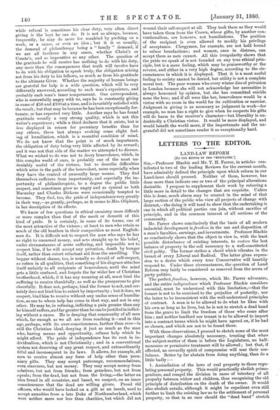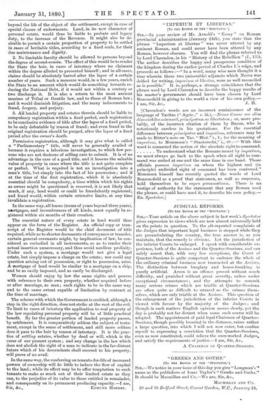LETTERS TO THE EDITOR.
LAND-LAW REFORM
rro THE EDITOR OF THE "SPECTATOR.']
Six,—Professor Blackie and Mr. T. H. Farrer, in articles con- tributed to two of the leading Reviews for the current month, have admirably defined the principle upon which reform in our Land-laws should proceed. Neither of them, however, has done more than indicate one or two of the principal alterations desirable. I propose to supplement their work by referring a little more in detail to the changes that are requisite. Unless this is done, much alarm may be created in the mind of that large section of the public who view all projects of change with distrust, —the doing it will tend to show that the undertaking is one in which all political parties can join, without sacrifice of principle, and in the common interest of all sections of the community.
Mr. Farrer shows conclusively that the basis of all modern industrial development is freedom in the use and disposition of a man's faculties, earnings, and investments. Professor Blackie as conclusively shows that the object in view is, with the least possible disturbance of existing interests, to restore the lost balance of property in the soil necessary to a well-constituted civil polity. The former strikes a chord which vibrates in the breast of every Liberal and Radical. The latter gives expres- sion to a desire which every true Conservative will heartily respond to. Under these circumstances, the question of Land Reform may fairly be considered as removed from the arena of party politics.
The perfect freedom, however, which Mr. Farrer advocates, and the entire independeme which Professor Blackie considers essential, must be understood with this limitation,—that the former is not to be exercised to the prejudice of posterity, nor the latter to be inconsistent with the well-understood principles of contract. A man is to be allowed to do what he likes with his own as long as he lives, but he is not to stretch a dead hand from the grave to limit the freedom of those who come after him ; and neither landlord nor tenant is to be allowed to import into a contract terms which he might have agreed on, if he had so chosen, and which are not to be found there.
With these observations, I proceed to sketch some of the most important changes absolutely necessary, trusting that when the subject-matter of them is before the Legislature, no half- measures or permissive treatment will be allowed ; but that, if effected, no cowardly spirit of compromise will max their use- fulness. Better by far abstain from doing anything, than do a little badly :— 1. Assimilation of the laws of real property to those regu- lating personal property. This would practically abolish primo- geniture, and compel the division in cases of intestacy of all property between widow and children, thus recognising the old principle of distribution on the death of the owner. It would also abolish entails, although it might be expedient even still further to limit the existing law as to the settlement of personal property, so that in no case should the "dead hand" stretch beyond the life of the object of the settlement, except in case of special classes of endowments. Land, in its new character of personal estate, would thus be liable to probate and legacy duty, to the increase of the Revenue. It might also be de- sirable to permit a certain proportion of property to be settled in cases of heritable titles, according to a fixed scale, for their due maintenance and dignity.
2. No limitable faculty should be allowed to persons beyond the degree of second-cousin. The effect of this would be to render the State the heir, in cases of intestacy where no claimant within the degree alluded to presented himself ; and in all cases, claims should be absolutely barred after the lapse of a certain number of years. Such a measure would, in a few years, enrich the State to an amount which would do something towards re- ducing the National Debt, if it would not within a century or two discharge it. It is also a return to the most ancient maxims of Tribal or Gentile law, and to those of Roman law ; and it would diminish litigation, and the many inducements to fraud, forgery, and perjury.
3. All landed property and estates therein should be liable to ,compulsory registration within a fixed period, such registration
to be conclusive evidence of title after the lapse of a fixed period, to be only defeatable by reason of fraud; and even fraud in the original registration should be purged, after the lapse of a fixed period after the owner's death.
Permissive registration, although it may give what is called • a " Parliamentary " title, will never be generally availed of because it requires a laborious investigation, to which few per- sons who are not desirous of selling care to submit. It is of no -advantage in the case of a good title, and it lessens the saleable value of property in cases where the title is not quite complete or perfect. What is required is not an investigation into a man's title, but simply into the fact of his possession ; and if at the time of the first registration, which it is absolutely essential should be compulsory, a time within which his rights as owner might be questioned is reserved, it is not likely that much, if any, land would or could be fraudulently registered; and fraud would, within certain extensive limits, at any time invalidate a registration.
In the same way, all leases (terms of years beyond three years), ralortgages, and incumbrances of all kinds, must equally be re- gistered within six months of their creation.
The essential nature of every estate in land would thus appear on the form of the Register. An official copy or tran- script of the Register would be the chief document of title required, while as to shorter documents of conveyance or transfer, certain general covenants might, by implication of law, be con- sidered as embodied in all instruments, so as to render their .actual insertion unnecessary, and thus avoid needless prolixity. Under such a system, a mortgage would not give a legal estate, but simply impose a charge on the estate; nor could any question arising out of possession, or right to possession, arise. A mortgage of land, would be similar to a mortgage on a ship, and be as easily imposed, and as easily be discharged.
Women should enjoy by law the same rights and powers with reference to their own property, whether acquired before or after marriage, as men ; such rights to be in the same way and to the same extent capable of limitation by contract at the time of marriage.
The scheme with which the Government is credited, although a -step in the right direction, does not strike at the root of the evil.
To limit to cases of intestacy the application to real property of the law regulating personal property will be of little practical benefit. By far the greater portion of landed property passes, by settlement. It is comparatively seldom the subject of testa- ment, except in the sense of settlement, and still more seldom does it pass to the heir by reason of intestacy. It is the prac- tice of settling estates, whether by deed or will, which is the curse of our present system ; and any change in the law which does not abolish the right of a man to indicate in the far-distant future which of his descendants shall succeed to his property, 'will prove of no avail.
In the same way, the conferring on tenants-for-life of increased -powers of ownership will do little to induce the flow of capital to the land ; while its effect may be to offer temptation to such tenants to make as much out of their limited estate as they can, to the prejudice of its value to those entitled in remainder, and consequently on its permanent producing capacity.—I am,



































 Previous page
Previous page